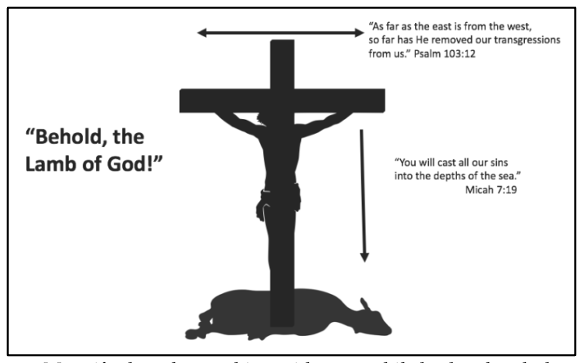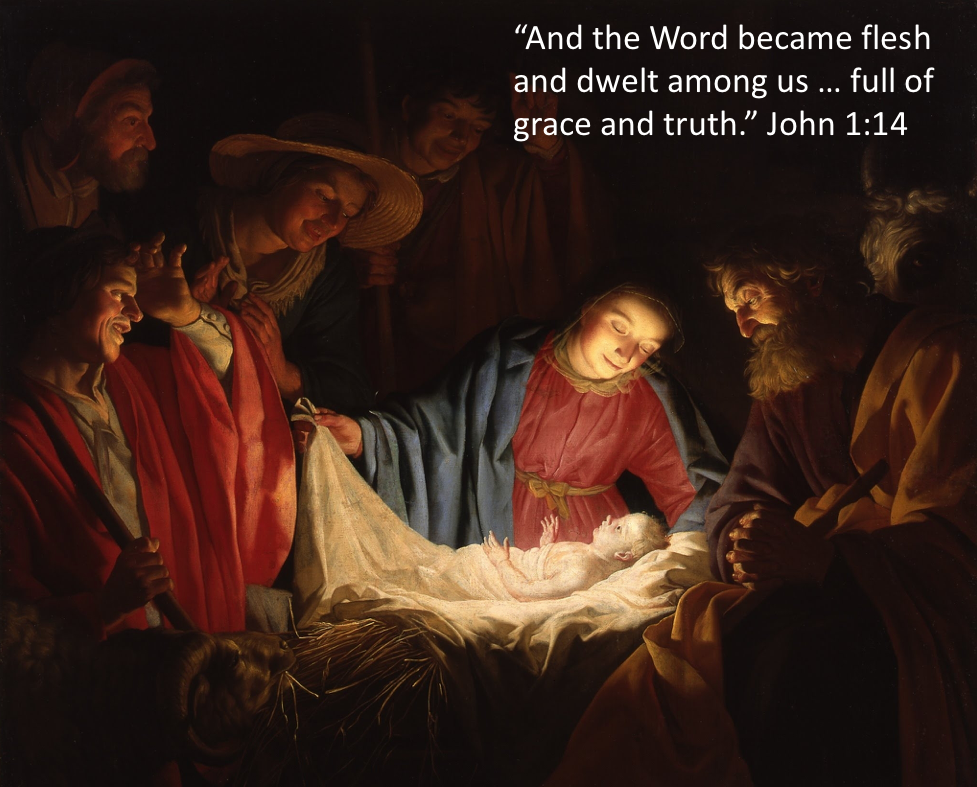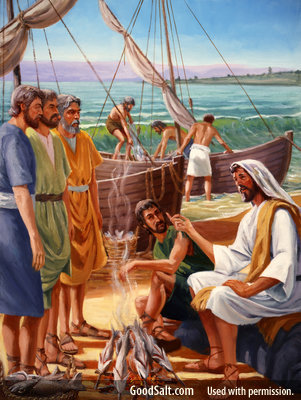“41 He first found his own brother Simon, and said to him, ‘We have found the Messiah’ (which is translated, the Christ). 42 And he brought him to Jesus.” John 1:41-42a
God’s plan for reaching the world for Christ is to use each believer in some way to introduce another person to Jesus Christ and then train them to do the same. Jesus cast a huge vision for His followers to pursue, before He ascended to heaven. Look in Mark 16:15: “Go throughout the whole world and preach the gospel to all people.” (GNT)
Can you envision each of us having a part in introducing someone to Jesus? You may not actually share the gospel with them, but you may plant a seed in their lives. You may pray for them, show them kindness, and invite them to church or a small group. Wouldn’t it be exciting to see new faces in your Sunday Schools, small groups, and worship services, because each one of you played a part in inviting someone to come see Jesus? In other words, each one is to reach one. This is how Jesus’ first disciples got started, as we shall see in this chapter.
We are going to discover how each of us can reach another person or persons for Christ. Turn to John 1:35-51. If each one of us is going to reach another person for Christ, we must understand and apply some important principles.
First, we must GROW CLOSER TO CHRIST (1:35-39). There is a transfer of focus in the text from John the Baptist to Jesus. In the verses preceding today’s passage, the apostle John began to present “four consecutive days in simple, chronological order based on his personal observation of the events.” [1] (1:19-51). On the first day John the Baptist stated who he was not and who he was (1:19-23) before identifying Jesus as the One Who possesses superior authority by saying that he himself was unworthy to do even the most menial service for Christ (1:24-28). On the second day, John pointed others to Jesus as the Lamb of God, the Preexistent One, the One Who baptizes with the Holy Spirit, and as the Son of God (1:29-34).
We see the humility of John the Baptist as he directs his own followers to Jesus on the third day. 1:35-36: This is what we call “intimate evangelism”—pointing those closest to you to Jesus. “Again, the next day” (the third of four days), John the Baptist focuses the attention of “two of his disciples” on “Jesus as He walked” by, saying, “Behold, the Lamb of God!” The apostle John informs us that one of these two disciples is “Andrew” (1:40). The other disciple is most likely the apostle John himself whose pattern is to refer to himself indirectly throughout his gospel [2] (cf. 13:23; 18:15-16; 19:26; 20:2-4, 8; 21:20, 23-24).
When the Baptist says, “Behold” [3] he is telling his two disciples to “stop whatever they are paying attention to” [4] and“look with wonder at the amazing Lamb of God!” John is encouraging his followers to transfer their focus onto Jesus now instead of him.
This is reinforced further by the apostle John’s use of Greek verbs and their tenses in 1:35-36. John the Baptist “stood” whereas Jesus “walked.” The verb translated “stood” [5] is in the pluperfect tense which means John was still standing at some point in the past after having previously stood. [6] Whereas the verb translated “walked” [7] is in the present tense and conveys that Jesus “was walking.“
“The action in God’s economy was shifting from John’s baptism to the ministry of Jesus.” [8]
As “the Lamb of God,” Jesus is the only One who can provide free, unlimited forgiveness of sin. Christ is like a calculator. A calculator is not only good for what it can do; but also, for what it can undo. Christ can hit the clear button of redemption and remove all our guilt and stain the moment we believe in Him for complete forgiveness (Acts 10:43; Col. 2:13-14).

My wife shared something with me a while back at lunch that really touched me. You can see her insights in the picture above. The horizontal cross beam reminds us of what Psalm 103:12 says,“As far as the east is from the west, so far has He removed our transgressions from us.” The cross of Jesus provides the basis for removing our sins as far as the east is from the west (which is an infinite line), far out of our reach so we cannot retrieve them. The vertical post of the cross points to Micah 7:19 which says, “You will cast all our sins into the depths of the sea.” The cross provides the basis of casting our sins out of our sight into the depths of the sea.To the human mind it is unclear how the Lord clears – but let me tell you – clearly – He can do it! Like John the Baptist, we must point those closest to us to the unlimited forgiveness of Jesus Christ, the Lamb of God.
1:37: John’s disciples now “follow” or go along with Jesus. Christ does not invite them to follow Him as His disciples here. They “heard” Christ speak and want to learn more from Him so “they followed Jesus.” This means nothing more than they are accompanying the Lord. Christ does not call them to follow Him as His disciples until about a year later (Mark 1:16-18). How do I know this?
When we examine all four gospels, it becomes clear that the disciples whom Jesus called to follow Him in Mark 1:16-18 were already believers. In the Spring of A.D. 26 Peter, John, Philip, and Andrew met Jesus for the first time (John 1:35-51) and believed in Him. When Jesus invited Philip to follow Him (John 1:43), He was asking him to accompany Him to Galilee, not make a discipleship commitment. Philip believed in Christ because of spending time with Him (1:45). Four days after that first encounter, Jesus’ other disciples believed in Him after He turns water into wine (2:1-11). Several days later during the Passover Feast in Jerusalem, Jesus cleanses the temple (2:13-22). During the next several months, Christ instructs these new believers in the fundamental truths of salvation and assurance as He evangelizes Nicodemus, the Samaritan woman, and the city of Sychar (John 3-4).
John 4:35 mentions four months until harvest. The harvest takes place in the months of April or May. Four months prior would be January or February. Thus, between the mention of the first Passover (John 2:13) which is in April, and the time mentioned in John 4:35, almost one year has passed. During these months, John the Baptist is evangelizing Judea (John 3:22-36) and baptizing. So, several things have already taken place before we come to Mark 1. Mark 1:14 informs us that John the Baptist is now in prison. In John 1-3, John the Baptist is still ministering publicly. But in Mark 1, he is in prison. So, these disciples have known Jesus for at least a year when Christ approaches them in Mark 1:16. Peter is a believer. He has evangelized the city of Sychar with Christ. But in Mark 1, he is fishing for fish.
1:38a: When Jesus looks over His shoulder and sees these two disciples of John “following” Him, He asks them “What do you seek?”
“These are the first recorded words of Jesus in John’s Gospel. The question is actually profound. The word seek (zeteō) occurs thirty-five times in John’s gospel, referring often to the Judeans who were seeking to arrest and to kill Jesus. With this question Jesus was focusing their attention on their ultimate concern: What is it that you want out of life?” [9]
Christ may be asking us right now, “What do you seek” in life? Love… security… fulfillment… relationships… money… a job… fame… or healing? What is it you are seeking currently? Are you seeking Jesus? Only Jesus can meet our deepest needs. Only Christ can give us the love… acceptance… security and forgiveness that we crave.
1:38b-39: Jesus was Who John’s disciples were seeking. They refer to Christ as “Rabbi,” which John translated as “Teacher.” These two men wanted to know where Jesus was “staying” so they could remain with Him and learn more from Him as they had done with John the Baptist. Christ invites them to “Come and see.” They first had to “come” with Jesus before they could “see” or comprehend where He was staying.This has spiritual significance as well.
“Only by coming to Jesus could they really comprehend what they were seeking spiritually. The same thing holds true today.” [10]
These men were eager to spend time with Christ. John tells us “They came and saw where He was staying, and remained with Him that day (now it was about the tenth hour).” (1:39). This is the first of several time notices in John’s gospel (cf. 4:6, 52; 19:14).
“The tenth hour” could refer either to 4 P.M., if John uses the Jewish timekeeping system from sunset to sunset, or to 10 A.M., if he uses the Roman’s reckoning of time from midnight to midnight. [11] Whether the apostle John meant 10 A.M. or 4 P.M., the main thing is he never forgot the hour when he first met Jesus. [12] The time that John and Andrew spent with Christ the rest of that day was very significant. It had eternal implications for them.
How about you? Have you met Jesus? Do you remember the first time you encountered Him? I remember the evening, not the exact hour, that I first met Jesus. It was on Monday, March 12, 1979, when Archie Griffin, a two-time Heisman Trophy winner and professional footbal player, came to our college to speak on the evening of Christian Emphasis Day. After Archie talked about his personal relationship with Christ, God showed me my need for the Savior so I could believe in Jesus for everlasting life.
After the assembly, I drove my parents’ car out into the country and pulled into a cornfield driveway to talk with God. Under the light of a beautiful full moon, while I was listening to a Christian song by Chuck Girard entitled “Lay Your Burden Down,” I received Jesus’ gift of forgiveness and eternal life by believing in Him. I will never forget that first meeting with Jesus that evening. It changed my eternal destiny and for that I am eternally grateful.
The words “staying” and “remained” in John 1:38b-39 come from the Greek word menō which the apostle John uses forty times in his gospel [13] to describe close fellowship with Christ, not one’s conversion. [14] Menō means “to stay, remain, abide, live, dwell.” [15] It literally refers to where one makes his or her home. We need to constantly make our home in Jesus’ presence. Where we make our home is where we spend our time. We must make the effort to reside in the truth of the Bible about Jesus and His love for us.
How at home with Jesus are you? Are you cultivating a closer relationship with Him through prayer, the study of His Word, and hanging out with other Christians? When we spend time with Jesus, as Andrew and John did, our lives will never be the same. When we grow closer to Jesus, His heart for the lost will become ours. We will begin to see those who need to hear the gospel the same way that Jesus does – as someone Jesus loves and longs to save.
GO TO THOSE CLOSEST TO YOU AND TELL THEM ABOUT JESUS (1:40-46). The key to having boldness is spending time with Jesus Christ. As a result of spending part of a day with Christ, Andrew realizes that he must share his good news with his brother, Simon Peter. 1:40: John identifies “Andrew,” [16] the brother of “Simon Peter,” as one of the two disciples of John the Baptist who accompanied Jesus that day. The name “Andrew” means “manly” [17] or “courageous.” [18] It takes courage to bring others to Christ, especially family.
1:41: Can you picture Andrew? “I have to tell Peter my news right now.” What is his news? “We have found the Messiah.” Andrew is the first in John’s gospel to identify Jesus as the promised “Messiah” or “Christ.” Evangelism is not complicated. It is very clear and simple. Andrew already has eternal life because he believed Jesus was the Christ, the Messiah-God. According to I John 5:1, that is all anyone one must do to be saved: “Whoever believes that Jesus is the Christ is born of God.”
“To obtain eternal life one must believe that Jesus is the Messiah in the sense that He gives eternal life to those who believe in Him (see the discussion of 11:25-27 and 20:30-31).
“When Jesus came, some, like John the Baptist (cf. 1:31, 33), already were born again since they believed in the Messiah for eternal life, though they did not yet know who He was. This is likely the case with Andrew and the other disciples of John the Baptist as well since John gives no report of Jesus speaking of eternal life to them. Evidently, they believed John’s preaching about the Coming One and believed in Him for eternal life. When they found out that Jesus is that Coming One, they sought to become His disciples.” [19]
The word “believe” in the New Testament means “to consider or be persuaded something is true and therefore worthy of one’s trust.” [20] Because all of us are born as sinners who deserve to die forever separated from God in the lake of fire (Ps. 51:5; Rom. 3:23; 6:23a; Rev. 20:15), we need a Savior to save us. The Bible tells us that Jesus Christ died for our sins and rose from the dead and is alive today to give eternal life to everyone who believes in Him (John 3:16; I Cor. 15:1-6).
The following 3-circle tool was developed by EvanTell, Inc., and is used with their permission. Ask yourself, what am I believing or trusting to get me to God’s heaven?

Starting from the left, some people believe their works will get them to heaven (1st Circle). Some people believe Christ plus their works will get them to heaven (2nd Circle). Others believe Christ alone will get them to heaven (3rd Circle).
Those who believe their works will get them to heaven are saying to God, “Your Son’s death was unnecessary.” For if you can get to heaven trusting your works, Jesus did not need to die on the Cross. Those who believe Christ plus their works will get them to heaven, are saying to God, “Your Son’s death was disappointing,” that is, Jesus paid for some of my sins, but I must pay for the rest. But Jesus did not make a down payment for your sins. He made the full payment for your sins (John 19:30). Those who believe Christ alone will get them to God’s heaven, are saying to God, “Your Son’s death was sufficient.” Jesus paid it all and so all we must do is believe in Him alone to take us to His heaven. It is that simple.
Then what does Andrew do? 1:42a: That says it all. He simply brought his brother Simon to Jesus. That is all Andrew knew to do. Just get him to Jesus. Come and see. He pointed his brother to the One who could change him and satisfy all his needs. The more time we spend with Jesus, the more His heart will become ours. So, the closer we get to the heart of Christ, the closer we get to the people for whom He died.
Jesus’ heart bleeds for the lost. Luke 19:10 explains: “For the Son of Man has come to seek and to save that which was lost.” The heart of our Lord is a seeking heart. Aren’t you thankful for that? We would still be lost in our sins if Jesus did not seek us out. Look at God’s heart. First Timothy 2:3-4 say, “For this is good and acceptable in the sight of God our Savior, who desires all men to be saved and to come to the knowledge of the truth.” Is there any human being God does not want to be saved? No. God created hell for the devil and his angels (Matt. 25:41), not for people. God desires that all people go to heaven, and He wants to use you and me to introduce people to the Savior Who can get them there. He may use you at work, school, the marketplace, the Mall, or He may use you in your back yard talking across the fence with your neighbor. The key is to open your heart to Him, so He can use you.
Those who live close to Christ capture His heart for the lost. For example, during my engagement to Pat before our wedding, I had no difficulty introducing her to my family, friends, and co-workers. Why? Because I had a personal relationship with her, and I was thrilled to be with her! And I wanted others to meet her because she was so awesome! How much more should this be true of our relationship with Jesus Christ? The church needs some Andrews who will be committed to bringing others to Jesus. We need older and younger Andrews.
Being an Andrew does not involve fancy evangelism methods and memorizing lots of Scripture, so you never make a mistake. Being an Andrew means getting them to Jesus. “Come and see.” Allow Jesus to make the transformation. You just be faithful to bring them to Jesus. We cannot change people, but Jesus can. We cannot make unfaithful spouses quit cheating, but Jesus can. We cannot make alcoholics quit drinking, but Jesus can. We cannot make drug addicts quit using, but Jesus can. We cannot make worriers stop worrying, but Jesus can. We cannot make abusive parents quit violating their children, but Jesus can. Our job is to get them to Jesus. Come and See! Don’t tell them to clean up their lives. Just ask them to come as they are and see Jesus for Who He really is. Then Christ will do the rest. Invite them to church… to Starbucks for coffee or to your own home for a meal where they can hear the clear and simple gospel.
In bringing his brother to meet Jesus, no man did the church a greater service than Andrew! Andrew appears two more times in John’s gospel (6:4-9; 12:20-22); both times he was bringing someone to Jesus. [21]
“A Christian’s testimony ought to accomplish what John the Baptist’s testimony did: pointing people to Jesus so that they want to follow Him. Notice the domino effect in this passage. Having encountered Jesus, Andrew wanted his brother to experience Him too. When you understand Who Jesus is, you’ll want others to know Him.” [22]
1:42b: And indeed, Jesus takes one look at Simon and sees more than a rugged fisherman. He identifies him as “Cephas,”[23] which means “a rock or stone.” “You are now Simon, but you will become Peter.” Jesus saw beyond the impulsive, head-strong, unreliable fisherman. He saw a solid rock. Jesus saw him for what he would become by His grace (even when it takes a while). Eventually God would use Peter to lead three thousand people to Christ through the preaching of one sermon on the day of Pentecost (Ac. 2:14-47).
Jesus’ interaction with Peter teaches us the importance of a new believer receiving a vision of what he or she can become in Christ. During this first stage of discipleship, the Lord gives us a vision of what we can become by His grace working in and through us. We need someone who can look beyond our faults and weaknesses and not only love us but also expect the best from us; someone who will believe in us; someone who will give us another chance; someone who will call us by another name. That Someone is Jesus Christ. Only He has the power to forgive all our sins and turn our weaknesses into strengths. That is what Jesus did with Peter and that is what He wants to do with you and me. Jesus sees the potential in each of us. You may think God cannot use you because of your weaknesses. Look to Christ to do through you what you could never do on your own!
But there is more. 1:43-44: On “the following day” (the fourth of four days beginning in 1:19) after Jesus renamed Peter, Christ “found Philip” [24] on the way “to Galilee” (1:43).The word “found” suggests Jesus was looking for Philip, He did not just happen to cross paths with him. Christ said to Philip, “Follow Me,” which could be translated, “keep on following Me” if Philip already was following Christ or “start following Me” if he was not yet following Christ.[25] When Jesus invited Philip to follow Him (1:43), He was asking him to accompany Him to Galilee, not make a discipleship commitment. Philip believed in Christ either through John the Baptist’s ministry before he met Jesus (cf. Acts 19:4), or as a result of spending time with Christ (1:45).
Some interpeters insist that following Christ is necessary to receive eternal life. I hear many pastors and churches preach this often. But this is contrary to the gospel of John which emphasizes believing in Christ alone as the only condition for eternal life (John 3:15-18, 36; 4:10-14; 5:24; 6:40, 47; 7:37-39; 11:25-27; 20:31; et al.).
Thus, what does Jesus mean when He says, “27 My sheep hear My voice, and I know them, and they follow Me. 28 And I give them eternal life” (John 10:27-28a)? Does this mean a person who truly believes must follow Christ as an obedient disciple to have eternal life which can never be lost as many preachers teach today?
The context of John 10:27-29 does not support this understanding. Jesus is using the word “follow” as a figure of speech referring to belief. Just as Jesus’ reference to sheep, is a figure of speech, so His reference to following Him is the same. Christ was not talking about literal sheep which physically follow a literal shepherd in this verse. Instead, He was illustrating salvation by picturing Himself as the Good Shepherd and believers as His sheep (cf. John 10:1-27).
In the context, Jesus addresses the unbelief of His Jewish audience, who questioned if He was the promised Messiah (John 10:24). Jesus replied to them, “I told you, and you do not believe. The works that I do in My Father’s name, they bear witness of Me. But you do not believe because you are not of My sheep, as I said to you.” (John 10:25-26). People who are not of His sheep do not believe. What then do His sheep do? They believe He is the Christ – the One Who gives eternal life to those who believe in Him. They hear His voice and respond in faith like sheep follow a shepherd (cf. John 10:4-5). They trust Him. So, in this context the unbelief of His Jewish audience (John 10:25-26) is set in contrast to His sheep following or believing in Him (John 10:27).
Bob Wilkins writes that “the picture of sheep hearing their shepherd’s voice and following him is a picture of childlike faith. In his book, The Gospel Under Siege, Zane Hodges says concerning that illustration, ‘That is to say, they [the sheep] commit their safety and well-being to the Shepherd who has summoned them to do so‘ (pg. 44). He goes on to say that this is clearly an act of faith, not discipleship.
“Hodges points out two other points which further prove that the figure refers to faith in Christ: the sequence of the coordinate clauses and the analogy of John 5:24.
“The verses in question have five clauses joined by the word ‘and.’ A definite progression is evident. The sequence of the clauses shows that ‘following Him’ is the condition—not the consequence—of eternal life. Jesus did not say, ‘I give them eternal life and they follow Me.’ Instead, He said, ‘They follow Me and I give them eternal life.’ Since faith in Christ is the sole condition of salvation in Scripture and in John’s Gospel, ‘following Him’ must be a figure for faith in Christ.
“In addition, John 5:24 is parallel to John 10:27-28. Both refer to hearing, believing, the giving of eternal life, the guarantee against eternal judgment, and the promise of the permanence of the relationship. The only difference between the two verses is that in John 10:27 believing is expressed by means of the figure of sheep following a shepherd.” [26]
Throughout the gospel of John, figures of speech are used to illustrate saving faith such as receiving (1:12; 5:43; 13:20), looking (3:14-15), asking (4:10), drinking (4:14; 7:37), hearing (5:24; 10:16, 27), coming (5:40; 6:35, 37, 44, 65; 7:37), eating bread (6:50, 51, 53, 54, 56, 58), entering (10:9), and following (10:27).
Christian author Charlie Bing writes: “These pictures of faith all denote receptivity, agreement, or trust. All are essentially simple activities and essentially passive. None communicates the idea of merit, work, effort, or achievement. Neither do they communicate an exchange of one’s life or the ongoing submission of one’s life to Jesus as Master in order to obtain eternal life.” [27]
The gospel of John distinguishes the freeness of salvation (John 4:10-14; 8:30-31a) from the costliness of discipleship (John 8:31-32). The only condition for everlasting life is belief in Jesus Christ alone for His free gift (John 3:14-18, 36; 4:10-14; 5:24; 6:40, 47; 7:37-39; 11:25-27; 20:31), but there are many conditions for discipleship including following Christ (John 8:12; 12:24-26; 21:19-22), abiding in Jesus’ word (John 8:31-32), loving one another (John 13:34-35), and bearing fruit (John 15:1-8). Those who insist that following Christ is a condition for receiving eternal life, fail to make this important distinction between conditions for salvation and conditions for discipleship. This has caused much harm to the unsaved because it distorts the gospel message making it more difficult for them to believe in Christ alone, and it also has caused the church to be less effective in evangelism.
The apostle John informs us that Philip was from the same city of “Bethsaida” as “Andrew and Peter” (1:44). This may explain why Jesus was looking for Philip. Andrew and Peter may have been acquaintances, if not friends, with Philip, and had something to do with Christ calling Philip. [28]
“Philip’s hometown of Bethsaida was on the northeast side of the Sea of Galilee (called ‘Bethsaida in Galilee’ in 12:21). Also, Andrew and Peter were born there. Politically, Bethsaida was in lower Gaulonitis in the territory of Herod Philip (Josephus The Antiquities of the Jews 18.2.1). Philip’s name is Greek, but his nationality cannot be inferred from that fact.” [29]
What Jesus did with Philip, Philip now does with Nathanael. 1:45a: As Jesus “found” Philip,so Philip “found” Nathanael. “Nathanael” means “God has Given” or “Given of God.” [30]
“The disciple learns from his Teacher, and spiritual multiplication occurs.” [31]
1:45b: Philip informs Nathanael, “We have found Him of whom Moses in the law, and also the prophets, wrote.” This was an indirect way of telling Nathanael they had found the promised Messiah; the One Moses wrote about “in the law” (Gen. 3:15; 22:8; 28:12; 49:10; Num. 21:9; 24:17; Deut. 18:15-19; et al.) and “the prophets” also “wrote” “about (Isa. 7:14; 9:6-7; 52:13-53:12; Dan. 7:13; Mic. 5:2; Zech. 9:9; et al.). [32]
Philip identifies Christ as “Jesus of Nazareth, the son of Joseph.” “This is one of only three references to Joseph other than the birth and infancy accounts (see John 6:42 and Luke 4:22). By saying this it appears that Philip was unaware that Jesus was born of a virgin or that He was born in Bethlehem.” [33]
Christ had such an impact on Philip, that Philip wasted no time in telling Nathanael about Him. When we spend time with Jesus, it does not take long for us to start witnessing to others.
Nathanael is a little more skeptical than the other men who came to Jesus (cf. 1:37-44). He does not respond in immediate faith. 1:46a: Nathanael was somewhat shocked by Philip’s mention of “Nazareth.” He had difficulty believing that the Messiah would come from such an insignificant and relatively unknown place as Nazareth. But Nathanael’s question, “Can anything good come out of Nazareth?” suggests that insignificance was not the only problem.
“There was something unclean about the place. That was due to its geographical proximity to Sepphoris, the Roman capital of Galilee. Sepphoris was located just four miles north of Nazareth. When the Roman rulers of this region needed workmen, they drew from the laborers of Nazareth. Some of the citizens of Nazareth exploited this opportunity for personal gain. And so the people of Nazareth were disdained by my many Jews. It was an insignificant place with a quesitonable reputation.” [34]
“Recent archaeological discoveries suggest the town housed a garrison of Roman soldiers, and where you find a town full of bored soldiers, you find a nesting ground for vice and immorality. In addition, many Jews believed that contact with Gentiles rendered them ritually unclean.” [35]
The truth is the best thing in all the world came out of Nazareth [36] and Nathanael was about to discover this firsthand.
So, what does Philip do? Does he give up or start to argue with Nathanael? No. 1:46b: He does the only thing he knows to do. He says, “Come and see” for yourself. I don’t have all the answers but come and meet Jesus. Then you’ll see what I’m talking about.
GIVE THEM JESUS SO HE CAN BRING THEM TO HIMSELF (1:47-51). 1:47: As Nathanael approaches, Jesus makes a statement that reflects His supernatural insight into the character of the man: “Behold, an Israelite indeed, in whom is no deceit!”
“Nathanael was the opposite of the original Israel, namely, Jacob, who was very deceitful (Gen. 27:35-36; 28:12; cf. John 1:51). Therefore, Jesus virtually said that Nathanael was an Israelite in whom there was no Jacob.“ [37]
Jesus is saying, “I know you Nathanael for who you are, and you are a man of integrity.” 1:48a: Nathanael is surprised that Jesus would say this, so he says to Him, “How do You know me?” Nathanael is stunned because he has never met Jesus before so how could Christ know anything about him?

Christ shows in His response to Nathanael that His knowledge of his character was of supernatural origin. [38] 1:48b: I have never really made a connection until today between Philip’s invitation to Nathanael, “Come and see” (1:46b), and Jesus’ words to Nathanael, “Before Philip called you, when you were under the fig tree, I saw you.” Before Nathanael sees Jesus, Jesus “saw” him.
Christ sees us even when we cannot see Him. We may feel or think that Jesus does not see us. You may say to yourself, “There are billions of people in the world today, how could Jesus possibly see me among all these people?” The Bible assures us that God does see us.
Christ “saw” Nathanael’s heart as well as his presence under the fig tree. Perhaps Nathanael was praying or reading the Bible under that fig tree. Jesus is saying, “Nathanael, I know who you are. I know everything there is to know about you. I know what you think and where you go and what you do. And I want to have a relationship with you.”
If you can identify with Nathanael’s skepticism, please know that Jesus loves you and He sees where you are. He will also meet you where you are at. He will provide answers to your questions if you are willing to listen. He may come to you in unexpected ways such as through a dream or a vision. He knows everything about you – your likes and dislikes, your sorrows and your joys, your thoughts, actions, and words. He knows the hidden wounds of your heart. He knows the dark secrets in the depths of your soul and He still loves you and He longs to be in a personal relationship with you.
How does Nathanael respond to the fact that Jesus saw him before they even met? 1:49: Christ’s supernatural knowledge of Nathanael moves the former skeptic to confess to Jesus, “Rabbi, You are the Son of God! You are the King of Israel!” Nathanael concludes, “Only the Son of God could know this about me. You must be Him!” For Nathanael to believe that Jesus is the Son of God resulted in him having eternal life. John 20:31 says, “But these are written that you may believe that Jesus is the Christ, the Son of God, and that believing you may have life in His name.” When as an Israelite, Nathanael says Christ is “the King of Israel!” he is acknowledging Jesus to be his own King. This former skeptic is celebrating the discovery of the long-awaited Messianic King.
All of us have a fundamental need to be seen, especially when we are hurting or lonely. Jesus not only tells us that He sees us. He wants to show us that He sees us. He sees our fears, our pain, and our stress. He also sees this world that is perishing without Him. When you experience that Jesus sees you, like Nathanael did, many of you will respond in faith to Jesus because you realize He is much more than a mere man. He is the God Who sees us.

This is the conclusion of a pregnant woman named Hagar after God met her in a place of despair and told her that the child in her womb would be a son called Ishmael because God heard her affliction (Gen. 16:11). So, Hagar called the name of the Lord, “You-Are-The-God-Who-Sees,” for she said, “Have I also here seen Him Who sees me?” (Gen. 16:13). God sees you and He wants to show you that He sees you.
1:50: Christ makes an important promise to Nathanael and the other disciples (the “you” in this verse is plural) that is set off by the phrase (“Most assuredly, I say to you…”)that is used nowhere else in the New Testament. But John uses this phrase twenty-five times in his gospel [39] to call attention to important affirmations. [40]
Jesus says to Nathanael, “Because I said to you, ‘I saw you under the fig tree,’ do you believe? You will see greater things than these.” “Nathanael is the first person in John’s Gospel who is specifically said to believe in Jesus, although John indirectly shows that John the Baptist, Andrew, Peter, Philip, and the unnamed disciple believed too.” [41] Jesus is affirming that when we believe what God reveals to us, He will give us an even “greater” experience of Himself. [42] In other words, Nathanael had not seen anything yet. Christ’s demonstration of His supernatural knowledge was small compared to what Nathanael would see in the future. [43]
Not only did Jesus know about Nathanael’s character (1:47) and where he was when Philip found him (1:48), but He also knew what Nathanael had been thinking about under the fig tree.

1:51: Jesus uses the imagery of Jacob’s dream at Bethel when he saw “the angels of God ascending and descending” on a ladder (Gen. 28:12) to describe the “greater” (1:50) revelation that Nathanael and his fellow disciples [44] (and John’s readers) would receive concerning Christ.
“This Old Testament account is what Nathanael had been thinking about under the fig tree. How do I know? Because not only did Jesus make explicit reference to this story, but He also told Nathanael that he was ‘an Israelite in whom there is no deceit’ (1:47). Being a deceiver was exactly what Jacob was known for (see Gen 27:1-36). So, by these two comments, Jesus was making Nathanael aware that He knew what he was thinking.” [45]
“From 1:47-48, 51 it can be inferred that Nathanael was meditating on Jacob’s life, particularly on the incident recorded in Genesis 28:12. Jacob saw the angels going up and down a ladder. But Nathanael would see . . . the angels of God ascending and descending on the Son of Man. Just as Jacob saw angels from heaven communicating with earth, so Nathanael (and the others; though you is singular in John 1:50, the you in v. 51 is plural) would see Jesus as the divine Communication from heaven to earth. The Son of Man, replacing the ladder, is God’s link with earth (cf. Dan. 7:13; Matt. 26:64). Perhaps Jesus was also indicating that He is the new ‘Bethel,’ God’s dwelling place (Gen. 28:17; John 1:14).
“As the Son of Man, Jesus left heaven to come to the earth. Jesus used the term ‘Son of Man’ of Himself more than 80 times. It speaks of His humanity and suffering and His work as ‘the ideal Man.’” [46]

Christ replaces the imagery of a ladder in Jacob’s dream with “the Son of Man,” a reference to Himself (1:51; cf. John 3:13-14; 5:27; 6:27, 53, 62; 8:28; 12:23, 34; 13:31). Instead of the angels of God ascending and descending on a ladder, Jesus says they are “ascending and descending upon the Son of Man.” Jesus Christ is the Ladder or Mediator between heaven and earth, between God and man (John 3:13; I Tim. 2:5). Christ grants access to eternity. As He would tell His disciples later in John’s gospel, “No one comes to the Father except through Me” (14:6). [47]
Throughout the remainder of John’s gospel, Nathanael, and the other disciples along with John’s readers, would receive evidence that Jesus was the sole Mediator between God and humanity. [48] Because Christ is fully God and fully man (John 1:1, 14), He is the only One Who could provide a bridge between heaven and earth.
“God had revealed Himself to Israel—the man and the nation—in a dream at Bethel previously (Gen. 28:10-22). Now God would reveal Himself to a true Israelite, Nathanael, to all Israel, and to the whole world, directly through Jesus.” [49]
Daniel’s “Son of Man” is the prophesied King of Israel Who will rule over the whole world in the earth’s final kingdom (Dan. 7:13-14). Hence, Nathanael’s reference to Jesus as “the King of Israel” (1:49) is also part of the imagery in 1:51. [50]
In addition, the “greater things” Jesus would reveal to Nathanael and the other disciples (1:50) would also involve Jesus’ Second Coming to earth as “the King of Israel” (1:49). Christ had already shown His supernatural knowledge to Nathanael (1:48b), but when He comes the second time, He will show His supernatural power (1:51). When Christ comes back as King, the Bible says, “6 Let all the angels of God worship Him. 7 And of the angels He says: ‘Who makes His angels spirits and His ministers a flame of fire.’ “ (Hebrews 1:6-7). When Christ returns to earth at the end of the Tribulation (Rev. 19:11-21), He will establish His Millennial Kingdom on earth (Rev. 21:1-6) where angels will worship and assist Him as the universal King.
No matter how skeptical a person may be about Christianity, just introduce them to Jesus and let Him do the rest. You and I cannot change people, but we can introduce them to the One who can. Jesus takes Simon and makes him Peter. He takes the condemned and makes her forgiven. Jesus takes the skeptic and makes him a believer. He takes the sinner and makes her a saint. Jesus takes the drunkard and makes him sober. Christ takes the prostitute and makes her pure. Jesus takes the worrier and gives him peace. He takes the spiritually blind and makes her see. Jesus takes the dirty and makes him clean. Jesus changes lives.
In April of 2014, our entire family moved from Iowa in the USA to the Philippines where God called us to multiply disciples until all hear His gospel of grace! I believed the Philippines was and still is a strategic nation for reaching other nations with the gospel. Why? Because each year nearly one million Filipinos go overseas (OFWs – Overseas Filipino Workers) to get temporary or permanent jobs to send money back home to their families. Our strategy was to reach these Filipinos with the gospel and disciple them before they left to work overseas! Then they could make disciples in other nations! We cast this vision among Filipino pastors and churches and equipped them to reach Filipinos in their area whom God could use mightily in another nation for Christ!? God wants to use ordinary people like you and me all around the world to introduce people to Jesus.
Each one reach one evangelism. It is very simple. Let me summarize:
- Recognize a person God wants you to reach and then pray for them (Who should come?) Pray for God to soften their heart and give you opportunities to share with them (think about them right now).
- Refer a person (Who should they come and see? It’s all about Jesus). Point them to Him.
- Remember our purpose (why should they come and see?) Because only Jesus can get them to heaven and only Jesus changes lives.
We need some Andrews and Philips who will determine by God’s grace, to bring one person or more to Jesus. Can you imagine how Andrew felt seeing his brother, Simon Peter, come to Christ? Can you imagine how he felt when Peter preached at Pentecost and three thousand people were saved (Ac. 2:14-47)? Andrew compels us to remember that God uses ordinary people to bring others to Christ. God may use you to introduce the next Simon Peter to Christ who will have a huge impact for the cause of Christ. The gospel is usually advanced one person at a time reaching one person at a time.
I think back about my mission trip to the southern Philippines on Sarangani Island in October 2015 with my friend, Pastor Boy. On one morning after preaching the gospel at an elementary school, I asked one of the teachers if there were any other schools nearby. He hesitated and then said, “Yes there is another school about a 40-minute hike from here, but you don’t want to go there.” “Really?” I said, “Why is that?” He said, “Because it is all Muslim, and it is not safe for Christians to go there.” For the next two hours, several Christians tried to persuade us not to go to this school, but I kept asking them if they had gone there and they had not. So, I said, “Who will go if we don’t go to them?” They had no answer. At this juncture, we had a choice to make – do we seek to please these well-intentioned believers who do not want us to go, or do we seek to please our Father in heaven who desires that all people be saved?
Eventually my translator and a local Christian tribal leader made the 40-minute hike with me through the mountainous jungle towards the Muslim village. With each step I anticipated what the Lord would do when we got there. What are You going to do when we arrive at this village, Lord? How are You going to protect us? How will these people respond?
When we arrived at the Muslim village we were warmly welcomed by the teachers and Muslim principal (see photo). One of the teachers said they expected us. “Why?” I asked. She explained that she saw our pictures on Facebook when we were on Balut Island across from Sarangani Island at a school. God used Facebook to prepare this village for our arrival. As we shared the gospel with the students and teachers, they were very attentive to the message. All one-hundred twenty students and teachers indicated they trusted in Jesus alone for His gift of salvation at the end of the gospel presentation.
Afterward we had a concert, with individual students praising our great God and Savior Jesus Christ. I got goose bumps listening to these newly saved children fill the jungle with songs of praise to their Savior!
Before we came to this village, the teachers and students may have felt that God does not see them. But when God brought us to them and enabled us to share the good news of Jesus Christ with them, they felt seen by God just as Nathanael did. And the most natural response for them was to receive Jesus by believing He is the Son of God (John 20:31), which is something that Islam vehemently denies. [51] But when people in darkness experience the God Who see them, religious barriers suddenly fade away so they can believe in Christ for everlasting life.
As these children in the jungle sang praises to the Lord Jesus, I thought to myself, this is why we are in the Philippines. If we don’t go to these unreached villagers, who will go? Had we sought to please people we would not have gone to that village. But because our aim was to seek the approval of our Father in heaven, we went to the village that God had already prepared to hear and believe the gospel.
What about you? Are you willing to go to people with the gospel that no one else wants to go to? Are you willing to go to lost individuals regardless of the costs because each person is precious and valuable to the Lord Jesus Christ? If not, ask the Lord to make you willing. Then ask Him to show you whom He wants you to share the gospel with this week. Write down their names and begin asking the Lord to prepare their hearts to hear and believe the gospel (John 16:7-11). Pray also for God to give you opportunities to share Jesus with them (Col. 4:3) this week before it is too late for them. And as you go to share with them, ask God to give you protection (2 Thess. 3:2-3), boldness (Acts. 4:29, 31), and clarity as you declare His gospel message (Col. 4:4) so His Word will spread swiftly throughout the area (2 Thess. 3:1).
Remember: The gospel is usually advanced one person at a time, reaching one person at a time.
Swindoll presents the four following different approaches to evangelism based on the different ways the first five disciples were “found” (John 1:41, 43, 45) and came to faith in Christ. [52]
1. MASS EVANGELISM (1:35-39). This approach involves one gifted person, in this case, John the Baptist, who proclaims the gospel message to audiences who have not received the gift of eternal life. The Baptist pointed people to Jesus as the Lamb of God (1:36) and invited them to believe in Him (John 1:7; 3:36; cf. Acts 19:4).
2. PERSONAL EVANGELISM (John 1:40-42). Personal evangelism takes place when a person shares the good news of Jesus Christ with a friend or loved one. This is exemplied by Andrew sharing with his brother Simon Peter. It is perhaps the most common and effective means by which people come to know the Lord, because they hear the gospel from someone they already know and trust.
3. CONTACT EVANGELISM (John 1:43-44). Contact evangelism, like personal evangelism, takes place when one individual shares the gospel with another, only in this case, the two may not have established a rapport. We have no record of contact between the two men before Jesus “found” Philip (John 1:43). It is likely that Andrew and Peter could have been acquaintances with Philip and spoke about him to Jesus. Upon Philip’s believing, Jesus called him to follow as a disciple. I wholeheartedly believe in “divine appointments” in which a person’s heart is prepared and the Lord places a willing messenger in his or her path. Contact evangelism doesn’t seek to convince another to believe; contact evangelism merely assists a willing heart to receive the gift of eternal life. However, belief may not occur right away. Many people who became Christians later in life admit to hearing the gospel several times before believing.
4. WORD EVANGELISM (John 1:45-51). The power of God’s Word dare not be underestimated. Nathanael’s conversion was preceded by his reading of Scripture about Jacob’s dream at Bethel involving angels of God ascending and descending upon a ladder (Gen. 28:10-22). Many people have come to know the Lord merely from reading Scripture, recognizing their need, and believing in Christ to give them eternal life while they were all alone, even before setting foot in a church. In 1898, two traveling businessmen recognized the power of the Bible to penetrate the hearts of nonbelievers and then founded an organization that is best known for its effective use of Word evangelism. We know them as The Gideons International. Their ministry of placing Bibles in hotels, hospitals, and schools has been the means of many people trusting Jesus Christ and becoming His disciples.
Prayer: Precious heavenly Father, thank You for entrusting us with Your gospel message to take to the entire world. Help us to grow closer to the Lord Jesus so His heart for the lost will capture ours in such a way that we will go to those closest to us and share Christ’s gospel message with them. Even though we may think we do not have what it takes to share Christ with others, especially our families, all You ask is that we tell them the truth about Jesus and He will do the rest. Some of us may identify with Nathanael’s skepticism, and we need to know that You see us and will meet us where we are at. Even though You know everything about us – the good and the bad – You still love us and want to be in a forever relationship with us. Show us our next step in knowing You better. In Jesus matchless name, we pray. Amen.
FOOTNOTES:
[1] Swindoll, Insights on John, pg. 45.
[2] Laney, Moody Gospel John Commentary, pg. 54.
[3] Ide
[4] Bauer, A Greek-English Lexicon of the New Testament, pg. 720.
[5] heistēkei
[6] Retrieved on June 14, 2023, from article entitled “Lesson 3 Overview of the Tenses, Perfect Active, Pluperfect Active, οἶδα & ᾔδειν, Condition Contrary to Fact” at https://ntgreek.net/lesson23.htm
[7] peripatounti
[8] Blum, The Bible Knowledge Commentary Gospels, pg. 551.
[9] Wilkin, The Grace New Testament Commentary, Kindle Edition, pg. 182.
[10] Constable, Dr. Constable’s Notes on John, pg. 58.
[11] Laney, Moody Gospel John Commentary, pg. 55; Swindoll, Insights on John, pp. 46-47.
[12] Roberston, A. T. Robertson’s Word Pictures in the New Testament, Kindle Location 51180.
[13] John 1:32, 33, 38, 39 (2); 2:12; 3:36; 4:40 (2); 5:38; 6:27, 56; 7:9; 8:31, 35 (2); 9:41; 10:40; 11:6, 54; 12:24, 34, 46; 14:10, 17, 25; 15:4 (3), 5, 6, 7 (2), 9, 10 (2), 16; 19:31; 21:22, 23.
[14] Some interpreters equate believing in Christ with remaining or abiding in Him. The apostle John equates abiding in Christ to keeping His commandments (I John 3:24a). If abiding is the same as believing, then believing is keeping God’s commandments. This would result in a works-salvation that is contrary to the purpose of John’s gospel which is to persuade his non-Christian readers to “believe [not abide] that Jesus is the Christ, the Son of God, and that believing [not abiding] you may have life in His name.” (John 20:31). For a more in-depth discussion on this topic see Joseph Dillow, Final Destiny, pp. 616- 619.
[15] Bauer, A Greek-English Lexicon of the New Testament, pp. 630-631.
[16] Andreas
[17] Roberston, A. T. Robertson’s Word Pictures in the New Testament, Kindle Location 420087.
[18] Bauer, A Greek-English Lexicon of the New Testament, pg. 76.
[19] Wilkin, The Grace New Testament Commentary, Kindle Edition, pg. 182.
[20] Bauer, A Greek-English Lexicon of the New Testament, pp. 818-819.
[21] Blum, The Bible Knowledge Commentary Gospels, pg. 552.
[22] Evans, The Tony Evans Bible Commentary, pg. 2201.
[23] Petros
[24] The name “Philip” (Philippos) means “lover of horses” (see Constable, Dr. Constable’s Notes on John, pg. 61).
[25] Akolouthei is a present imperative active verb which emphasizes the
continuation of following Christ if Philip had already begun to do so or to start
the ongoing process of following Christ if he had not begun to do so yet.
[26] Robert Wilkin, “Is Following Christ a Condition of Eternal Life?” Grace in Focus (Grace Evangelical Society, April 1990).
[27] Dr. Charlie Bing, “The Condition For Salvation In John’s Gospel,” Journal Of The Grace Evangelical Society, Vol. 9:16, (Spring 1996): 31.
[28] Wilkin, The Grace New Testament Commentary, Kindle Edition, pg. 182.
[29] Blum, The Bible Knowledge Commentary Gospels, pg. 553.
[30] Constable, Dr. Constable’s Notes on John, pg. 61
[31] Wilkin, The Grace New Testament Commentary, Kindle Edition, pg. 182.
[32] Laney, Moody Gospel John Commentary, pg. 57; Constable, Dr. Constable’s Notes on John, pg. 61.
[33] Wilkin, The Grace New Testament Commentary, Kindle Edition, pg. 182.
[34] Laney, Moody Gospel John Commentary, pg. 57.
[35] Swindoll, Insights on John, pg. 48.
[36] Robertson, A. T. Robertson’s Word Pictures in the New Testament, Kindle
Location 51394
[37] Constable, Dr. Constable’s Notes on John, pg. 63.
[38] Laney, Moody Gospel John Commentary, pg. 58.
[39] The Greek phrase Amēn amēn legō humin is used in John 1:51; 3:3, 5, 11; 5:19, 24-25; 6:26, 32, 47, 53; 8:34, 51, 58; 10:1, 7; 12:24; 13:16, 20-21, 38; 14:12; 16:20, 23; 21:18
[40] Blum, The Bible Knowledge Commentary Gospels, pg. 554.
[41] Wilkin, The Grace New Testament Commentary, Kindle Edition, pg. 182.
[42] Evans, The Tony Evans Bible Commentary, pg. 2202.
[43] Constable, Dr. Constable’s Notes on John, pg. 65.
[44] The “you” in the Greek text shifts from second person singular in 1:50 to second person plural in 1:51.
[45] Evans, The Tony Evans Bible Commentary, pg. 2202.
[46] Blum, The Bible Knowledge Commentary Gospels, pg. 554.
[47] Evans, The Tony Evans Bible Commentary, pg. 2202.
[48] Wilkin, The Grace New Testament Commentary, Kindle Edition, pg. 183.
[49] Constable, Dr. Constable’s Notes on John, pg. 66.
[50] Ibid.
[51] See Sura 4:171 (pg. 96); Sura 5:19, 75-76 (pp. 100-101, 109); Sura 9:30-31 (pg. 183); Sura 17:111 (pg. 295); Sura 23:91 (pg. 364); Sura 25:2 (pg. 378) in The Qur’an, English Translation by Abdullah Yusuf Ali (Goodword Books, Kindle
Edition).
[52] Adapted from Swindoll, Insights on John, pp. 51-53.













